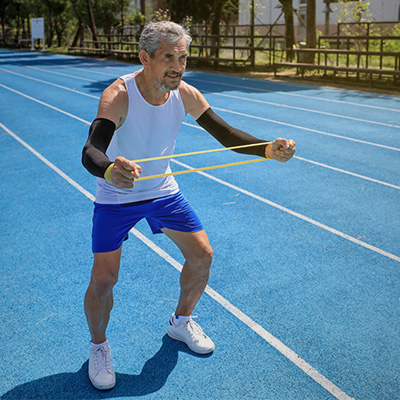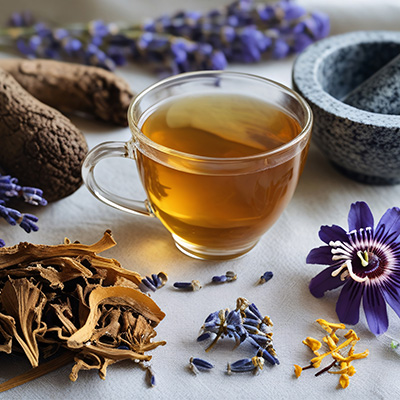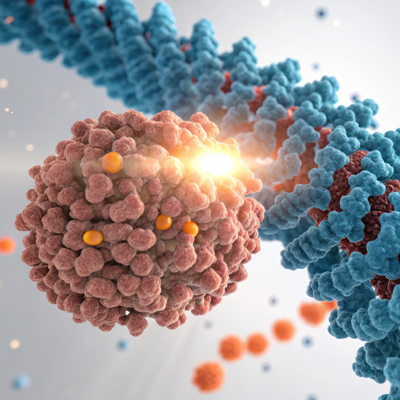Metabolism
All information about "Metabolism" and the related magazine articles can be found here.
Our articles are written clearly and link to scientific studies where relevant. This is how we meet our own standards: we regularly deliver new, high-quality content for you—free of charge, no sign-up required, with the highest possible benefit to you.

Your rest compass for the summer: Naturally in balance with saffron.
Gentle support from nature for mental serenity and your well-being
Does your inner rhythm sometimes falter in the hustle and bustle of everyday life and does your serenity wane? With saffron, nature offers a valued way to harmonize the carousel of thoughts and cultivate your inner center. Discover here how the red gold can lead you back to new balance and lightness.

Inner peace for hot days, with GABA and rose root extract
Support your nervous system with herbal active ingredients that can reduce stress, stabilize your mood and promote your mental balance even in the summer heat.
Summertime often brings stress due to heat, travel or busy schedules. GABA and the adaptogenic rose root extract help you to get through the summer more calmly by promoting your stress resistance and inner peace. So you can enjoy your emotional balance and greater well-being.

Light legs, light day. How horse chestnut, vitamin C and OPC help against heaviness
Discover how proven plant extracts and vitamins can relieve the feeling of heavy legs. For more lightness in everyday life for mom, grandma & co.
Heavy legs after a long day? Horse chestnut, vitamin C and OPC can promote blood circulation, strengthen the veins and noticeably relieve the feeling of tired, weighed-down legs. Ideal for anyone who stands a lot, walks a lot or simply wants to stay active in everyday life. Whether mom is out shopping or grandma is out for a walk. Find out how these natural active ingredients support your leg health and give you new lightness.

Mental strength in summer?
Ashwagandha and roseroot help you stay calm and alert on hot days
Summer brings light, energy and sometimes a lot of stress. So it's a good thing that nature has two herbal allies in the form of ashwagandha and roseroot, which can promote mental balance and resilience. Find out more!

Rescue for cozy summer evenings
Natural mosquito repellent with vitamin B1 & essential oils
Whether it's a garden party or an evening stroll: as soon as it starts buzzing, the mood is gone. Vitamin B1 and essential oils such as citronella or lavender can help to gently keep mosquitoes away. How does this work? Read here how natural remedies ensure carefree summer evenings.

Summer, sun, full concentration!
How phosphatidylserine and omega-3 can boost your concentration
The sun is shining but your concentration is waning? Discover how phosphatidylserine and omega-3 fatty acids can naturally boost your mental performance.

Relaxed baby bump: Natural support with inositol, folic acid, cranberry & D-mannose
Balance and well-being for women who want to have children or during pregnancy
Wanting to have children or already pregnant? A lot changes during this special phase. Smart nutrients such as inositol, folic acid, cranberry and D-mannose can provide targeted support: They promote hormonal balance, strengthen the urinary tract and bring more balance to everyday life. Find out now how you can do something good for yourself naturally.

Start your vacation full of energy with potassium & magnesium citrate
How to keep you and your family fit, active and balanced even in the heat
On summer vacation, electrolytes such as potassium and magnesium quickly become unbalanced. This can affect energy, muscles and concentration. Find out here how you can strengthen your inner balance with smart nutrition and targeted supplements.

Strong heart, strong life. Promoting men's health naturally
Gain new energy and vitality with coenzyme Q10, chokeberry as a medicinal plant and targeted care for the cardiovascular system.
The heart is the engine of your life - and men in particular should pay special attention to it. Find out how you can use the effects of coenzyme Q10, the healing power of the aronia berry and a healthy lifestyle to strengthen the function of your cardiovascular system and support your overall health as a man.

When the hormone balance changes
Gentle nutritional support through the menopause
The menopause changes many things - both physically and emotionally. Myo-inositol, vitamin D3 and magnesium can help to boost your well-being, support your metabolism and activate new sources of energy. Find out more here!

Comfort food for super moms
Choline, lecithin & vitamin B12 - powerful micronutrients for a strong pregnancy
Did you know that certain nutrients can have a positive effect not only on your well-being, but also on your baby's development? Choline, lecithin and vitamin B12 are little helpers with a big effect - for strong nerves, clear thoughts and a good gut feeling during this special time.

Playground power for every day
Calcium & vitamin K2: For bone health that grows with you
Whether romping around with the children or the daily balancing act between job and family - strong bones are the stable foundation. Find out how calcium and vitamin K2 can playfully help to strengthen your bones.

Naturally powerful: Turmeric, boswellia & ginger
Learn how to gain more zest for life with plant power
Plant-based active ingredients can help to reduce inflammation and make everyday life more active and mobile - whether in the garden, during sport or on a family outing.

Finally sleep well again - even in summer!
Discover natural sleep aids with melatonin, passion flower & co.
Is the summer light depriving you of sleep? We show you how you can support your sleep-wake rhythm with natural remedies such as melatonin and passionflower.

Sun protection from within - with the power of vitamin A, astaxanthin and omega-3
Strengthen your skin with natural nutrients that reduce oxidative stress, soothe inflammation and prevent premature ageing.
The first rays of sunshine are here - but your skin is particularly sensitive after the winter. Discover how vitamin A, the antioxidant astaxanthin and essential omega-3 fatty acids can protect your skin from the inside out and optimally prepare it for UV radiation. For a radiantly healthy complexion and effective anti-ageing support.

Spring cleaning for the body!
Drain naturally - with nettle, dandelion & potassium
Find out more about dandelion, stinging nettle and potassium to gently drain your body and get back on track with ease!

Naturally against allergies - Black cumin oil and quercetin in use for your well-being
Gentle support from nature for hay fever, pollen allergies and allergic reactions
Itchy eyes, sneezing attacks and constant pollen stress? Black cumin oil and quercetin offer natural help for allergic symptoms. Find out how the two herbal active ingredients work, when it is the right time to use them and what you should look out for when choosing them.

Strong through the pollen season with omega-3 and vitamin E
How to strengthen your child's airways
When pollen irritates the airways, it can quickly become unpleasant for children. Find out why omega-3 and vitamin E can not only support but also prevent and how you can easily incorporate the two substances into your everyday life!

Fit for spring: Stimulate metabolism with inulin, probiotic foods & intestinal cure
Intestinal cleansing for better digestion, the natural effects of inulin and the benefits of probiotic foods for your metabolism
Get a vital start to spring and bring your body into balance - with targeted nutrition that boosts your metabolism, supports digestion and rebalances your gut with the help of a gut cleanse, inulin and probiotic foods. Find out how to boost your gut health and gain new energy - from the inside out!

New cell energy with B vitamins, NADH and alpha lipoic acid
NADH, alpha lipoic acid and B vitamins play a central role in human metabolism for energy, concentration and cell protection.
Discover how these nutrients support the body against exhaustion, oxidative stress and loss of performance - for more vitality and mental strength in everyday life!

Sleep better with lemon balm, passionflower and L-theanine
These natural helpers bring peace to your evening
Sleep disorders? Stress in the evening? Herbal helpers such as lemon balm, L-theanine and passionflower can gently support the sleep-wake rhythm and help you to finally calm down. Read the article now to find out how you can harness the power of nature for restful nights.

Spring fever for the soul
Naturally more balance with 5-HTP, L-tryptophan and vitamin B6
The sun is shining - but everything still feels heavy inside?
These three mood boosters gently help you arrive in spring: for more rest, sleep and stability. Find out more here!

Building inner strength - more relaxed through spring
Plant adaptogens for more balance, energy and mental freshness
Spring is the perfect time to recharge your batteries and do something good for yourself. Rhodiola and cordyceps provide natural and effective support. Find out more here!

Strengthen your immune system with rockrose, zinc and vitamin C
Natural support for your immune system
Cistus, zinc and vitamin C can provide your body with valuable support in moody weather. Find out how these three building blocks gently strengthen your defenses and give you more well-being in everyday life.
Understanding your metabolism: What you need to know to optimize it
Have you ever wondered why some people seem to stay slim effortlessly, while others constantly struggle with their weight? Or why you feel energized after certain meals and just tired after others? The key to these mysteries may lie in your metabolism!
How does the metabolism in our body work?
Metabolism, also known as metabolism, comprises all the biochemical processes in our body that are necessary to generate, store and use energy [1]. It is important because it supports vital functions such as respiration, digestion, cell repair and growth.
It consists of two main processes: anabolic (building up) and catabolic (breaking down) energy metabolism. In anabolic metabolism, molecules are built up and energy is stored, while catabolic metabolism breaks down larger molecules into smaller ones to release energy [3,4]. These processes take place continuously, even when we sleep.
What factors influence the metabolism?
Energy metabolism is influenced by various factors, including age, gender, genetics, muscle mass, hormonal balance and lifestyle factors such as diet and physical activity. With increasing age, energy metabolism tends to decrease, while muscle mass and physical activity can have a reverse effect [2].
Can you really speed up your metabolism?
Yes, the biochemical processes can be accelerated by various measures. Regular physical activity, especially strength training, can promote muscle building, stimulate fat burning and effectively increase the basal metabolic rate. Certain foods and spices such as green tea, hot peppers and protein-rich foods can also cause a small increase in fat metabolism by activating enzymes that support the breakdown of carbohydrates [2]. L-carnitine, for example, can support fat burning.
Which foods promote a healthy metabolism?
Foods that are rich in protein, fiber and healthy fats promote a healthy metabolism. These include [2]:
- Lean meat such as chicken and turkey
- Fish such as salmon and mackerel, eggs
- Nuts such as almonds and walnuts
- Seeds such as chia seeds and linseed
- Whole grain products
- A variety of fruit and vegetables
How does exercise affect the metabolism?
Exercise, especially intensive training and strength training, increases energy expenditure both during exercise and during rest periods afterwards. Regular physical activity helps to build muscle mass, which increases basal metabolic rate and boosts energy metabolism in the long term [2]. Aerobic exercises such as running, swimming or cycling are also effective in improving energy metabolism [2].
What are the most common metabolic disorders and their symptoms?
Zu den häufigsten Stoffwechselstörungen gehören [5,6,7]:
- Hypothyroidism (underactive thyroid gland): Symptoms may include fatigue, weight gain, sensitivity to cold and depression.
- Hyperthyroidism (overactive thyroid): Symptoms include weight loss, nervousness, excessive sweating and palpitations.
- Diabetes mellitus: symptoms include increased thirst, frequent urination, tiredness and blurred vision. Here you can find out what diabetics should not eat.
- Metabolic syndrome: symptoms include obesity, high blood pressure, high blood sugar levels and high cholesterol levels.
If a metabolic disorder leads to obesity, this can cause a number of secondary diseases, including osteoarthritis. Osteoarthritis is a joint disease caused by the breakdown of cartilage.
Did you know that the trace element selenium can regulate thyroid hormones as an important antioxidant? Find out more about it here,
How do hormones influence the metabolism?
Hormones such as insulin, thyroxine, cortisol and adrenaline play a central role in the regulation of metabolism [8]. Insulin regulates blood sugar levels and promotes the uptake of glucose into the cells. Thyroxine influences energy consumption and the body's basal metabolic rate. Cortisol, also known as the stress hormone, regulates sugar and fat metabolism and can slow down energy metabolism if it is chronically elevated. Adrenaline, also known as the fight or flight hormone, mobilizes energy reserves and temporarily increases energy expenditure [2].
Vitamins can also play a role. You can find out more about vitamin B6 and its influence on processes in the body here.
What role does the metabolism play in weight loss?
Energy metabolism determines how many calories the body burns at rest and during activity. A higher metabolism means that the body uses energy more efficiently and burns more calories, which helps with weight loss. Food intake and exercise are key strategies to optimize biochemical processes and support weight loss. A balanced diet with a moderate calorie deficit and regular exercise is crucial for successful long-term weight loss [2].
Which myths about metabolism are widespread?
A common myth is that people with a slow metabolism cannot lose weight. In fact, food intake and exercise play a greater role than the individual's metabolism.
Another myth is that small, frequent meals can greatly boost a poor metabolism, although the effect on overall metabolism is minimal. Instead, the quality and composition of food, as well as the total amount of calories consumed, is crucial for metabolic health and weight management [2].
While certain foods and activities can slightly increase energy metabolism in the short term, the effect is often minimal and not long-term. The basal metabolic rate is mainly determined by factors such as muscle mass, age and gender.
Which metabolic type am I?
The classification into different metabolic types is an approach that attempts to explain individual differences in energy consumption and energy metabolism. People respond differently to diet and exercise, partly due to genetic factors. Some tend to gain weight easily, while others tend to stay lean, regardless of their diet. Metabolic type can influence how efficiently the body utilizes nutrients and burns energy. Although this typing is not always clear-cut and individual variations are large, it can help to adapt personal diet and fitness strategies to achieve health goals [2].
There are various approaches to classifying metabolic types, but no universally recognized typology exists. The classification into specific metabolic types is scientifically controversial and not clearly proven. Although individual metabolic differences exist, they cannot simply be divided into fixed categories. Here are some frequently discussed metabolic types [9]:
- Ectomorph: People of this type tend to be lean and often have difficulty gaining weight. They usually have an active metabolism and burn calories quickly.
- Mesomorph: Mesomorphs are often athletically built, have good muscle definition and can build muscle relatively easily. They often have a balanced metabolic process.
- Endomorphic: Endomorphic types tend to put on fat easily and often have difficulty losing weight. They usually have a slower metabolism.
- Metabolic types based on food reactions: Some classifications are based on how the body reacts to different foods. For example, people may react differently to high carbohydrate, high protein or high fat diets, which affects their metabolic type.
- Genetic and hormonal differences: Some approaches consider genetic and hormonal factors that may cause impaired metabolism, such as insulin sensitivity, thyroid function and other hormonal regulation [2]. Genetic factors play a role, but lifestyle factors such as diet and exercise often have a greater influence.
It is important to note that metabolic types are often a mixture of different characteristics and are not clearly delineated. Determining an individual's metabolic type can therefore be a complex matter and often requires an individualized approach, taking into account various factors such as genetics, lifestyle, dietary habits and physical activity [2].
Guide to determining your metabolic type and how to use it
Self-observation and analysis
Start by observing your physical reactions to different diets and activity levels. Note how you feel after certain meals - whether you have quick energy or feel tired, how long the feeling of fullness lasts and how your body reacts to different types of physical activity.
Take genetic influences into account
Find out about family predispositions regarding energy metabolism and weight regulation. People in the same family often tend to have similar metabolic patterns, which can give clues to your own metabolic types.
Professional support
Consult a nutritionist or endocrinologist for a personalized metabolic analysis. You can have tests performed that measure metabolic parameters such as resting metabolic rate and responses to specific foods to more accurately determine your individual metabolic type.
Adaptation of diet and lifestyle
Based on your observations and the results of the tests, you adjust your diet and exercise patterns. For example, if you find that you respond well to high-carbohydrate meals and feel energized after protein meals, you can adjust your diet accordingly. Similarly, you can optimize your exercise program by choosing activities that match your metabolic types - be it intense training or gentler forms of exercise [2].
Long-term monitoring and adjustment
Energy metabolism can change over the course of a lifetime, influenced by age, hormone levels, lifestyle and other factors. Stay alert to changes and adjust your strategies accordingly to support your long-term health goals [2].
By having your energy metabolism analyzed and adjusting your diet and lifestyle accordingly, you can make more targeted decisions that promote your health and well-being [2].
At a glance
A well-functioning metabolic process is crucial for health and well-being. You can support and optimize your metabolism through targeted measures:
- regular exercise
- a balanced diet
- Minimization of stress
By consciously addressing the factors that influence metabolism and incorporating healthy habits into your daily life, you can not only better control your weight, but also increase your energy and improve your quality of life [2].
Sources
[1] https://flexikon.doccheck.com/de/Stoffwechsel
[2] https://www.ncbi.nlm.nih.gov/pmc/articles/PMC6019055/
[3] https://studyflix.de/biologie/katabolismus-2621
[4] https://flexikon.doccheck.com/de/Anabolismus
[5] https://www.deutsches-schilddruesenzentrum.de/wissenswertes/schilddruesenerkrankungen/
[6] https://www.bundesgesundheitsministerium.de/themen/praevention/gesundheitsgefahren/diabetes
[7] https://www.internisten-im-netz.de/krankheiten/metabolisches-syndrom/was-ist-ein-metabolisches-syndrom/
[8] https://blog.ksb.ch/wissen/die-wichtigsten-hormone/
[9] https://www.focus.de/gesundheit/ernaehrung/sind-sie-ekto-meso-oder-endomorph-der-stoffwechsel-entscheidet-darum-nehmen-manche-menschen-einfach-nicht-ab_id_125536560.html
